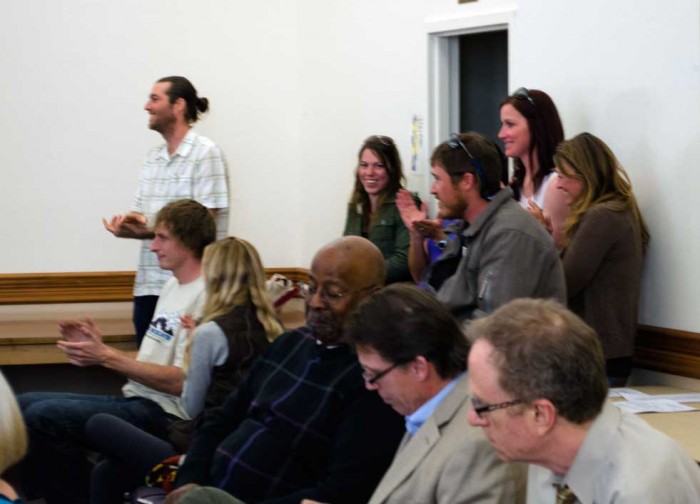
A vote by the Academic Senate to oppose the discontinuation of a wilderness leadership program Thursday afternoon was met with cheers from students in attendance.
The senate voted 25-to-8 against a proposal to eliminate the Outdoor Education option in the kinesiology major.
Reid Cross, a kinesiology faculty member who created the Outdoor Education option, said he was pleased that a decision has been reached.
The ruling outlined the importance of academic procedures like the senate vote, Cross said.
“Procedure protects the minority view,” he said. “And that’s what university is all about.”
Enrollment in the program has been suspended since May 2012.
The senate’s vote provides a possibility that the program can be rekindled, Cross said, although where its future lies is currently unclear.
“The program won’t be exactly as it was,” Cross said. “It could be better.”
Had it been discontinued, it would not “rise from the ashes like a phoenix,” he said.
While the Academic Senate has made its recommendation, the final deliberation will come from Belle Wei, provost and vice president for academic affairs.
If Wei follows the senate’s lead and rejects the proposal, the program will return to suspension, according to the university’s discontinuation guidelines. Otherwise, the program could still face discontinuance if the proposal is approved.
If the program remains on suspension, the future of the option lies in a discussion between the College of Communication and Education and the kinesiology faculty, including those in Outdoor Education, said Paula Selvester, chair of the Academic Senate.
“It’s a ‘wait and see’ right now,” she said.
If the program remains on suspension, the future of the option lies in a discussion between the College of Communication and Education and the kinesiology faculty, including those in Outdoor Education, said Paula Selvester, chair of the Academic Senate.
Joshua Trout, chair of the kinesiology department, said that while the the final decision may not end in discontinuation, it doesn’t change the financial problems the option is facing.
“Our department can’t afford it,” Trout said. “There are students and faculty out there who think this is important but it’s a problem of finance.”
The proposal for discontinuing the program cited liability risks, staffing restrictions and disproportionate costs compared to other majors and options as elements that troubled the program financially.
The courses are costly and would divert money from programs that would serve the majority of kinesiology students, he said.
“We have 900 students in kinesiology,” Trout said. “Those students need our time and money.”
The department does not intend to revive the option at this time, he said.
“With significant overhaul and dramatic course changes, we might consider it,” Trout said. “But it’s completely broken beyond repair.”
For past and present students of Chico State’s outdoor education curriculum, the vote was a sign of hope that the program might be reinitiated someday.
Steven Wescott, a Chico State alumnus who graduated in 2009 with a certificate in Outdoor Education, came from Berkeley to attend the meeting.
Now employed with Outward Bound, an outdoor education organization, Wescott is hopeful that the issues surrounding the program can be resolved.
His education at Chico State provided a foundation that he can reflect upon whenever he runs into problems in his profession, he said.
“Whenever I get in those situations I come back to what I learned here,” Wescott said.
Samantha Fantuzo, senior kinesiology major, is one of the last students left in the program as others have graduated since the suspension.
Fantuzo took part in several field trips involving hiking, skiing, rock climbing and backpacking during the option’s first year.
“I feel like I’ve gotten all my strength from this program,” she said.
Christine Lee contributed to this report.
The Orion can be reached at [email protected] or @theorion_news on Twitter.








